 Saint Moses The Black is one of the most revered and venerated of the Orthodox saints. He is among a list of Orthodox saints from the continent of Africa who were instrumental in establishing the Christian Church throughout the world. The longer I am Orthodox, the more I am amazed at how ignorant I was about the history of the Church and its origins. It hadn't occurred to me that the Orthodox church in Africa predates Islam by some 600 years. I did not know that many of the slaves who were captured and brought to the North American continent were Orthodox Christians. I surely didn't know that African Americans are rediscovering their true spiritual roots and returning to the faith of their fathers in great numbers both on this continent and in Africa.
Saint Moses The Black is one of the most revered and venerated of the Orthodox saints. He is among a list of Orthodox saints from the continent of Africa who were instrumental in establishing the Christian Church throughout the world. The longer I am Orthodox, the more I am amazed at how ignorant I was about the history of the Church and its origins. It hadn't occurred to me that the Orthodox church in Africa predates Islam by some 600 years. I did not know that many of the slaves who were captured and brought to the North American continent were Orthodox Christians. I surely didn't know that African Americans are rediscovering their true spiritual roots and returning to the faith of their fathers in great numbers both on this continent and in Africa.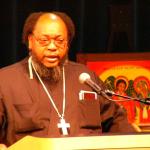 I had the pleasure recently of spending a few days with Father Moses, well, not the one pictured in the icon, but one who has honored him by taking his name. Father Moses Berry is an African American Orthodox priest who pastors a church in the Russian Arch Diocese in America. Father Moses is a priest with the mission of making all African Americans aware that to truly embrace their culture and roots they must return to the Orthodox Faith. To accomplish this, Father Moses has established the Brotherhood of St. Moses the Black. The Brotherhood is "a pan-Orthodox non-profit organization. Its mission is to minister to Americans the gift of Orthodoxy. In an effort to be good stewards of the manifold grace of God (1 Peter 4:10), the organization presents an annual conference that targets those who have little exposure to Orthodoxy as well as to the African roots of Orthodoxy."
I had the pleasure recently of spending a few days with Father Moses, well, not the one pictured in the icon, but one who has honored him by taking his name. Father Moses Berry is an African American Orthodox priest who pastors a church in the Russian Arch Diocese in America. Father Moses is a priest with the mission of making all African Americans aware that to truly embrace their culture and roots they must return to the Orthodox Faith. To accomplish this, Father Moses has established the Brotherhood of St. Moses the Black. The Brotherhood is "a pan-Orthodox non-profit organization. Its mission is to minister to Americans the gift of Orthodoxy. In an effort to be good stewards of the manifold grace of God (1 Peter 4:10), the organization presents an annual conference that targets those who have little exposure to Orthodoxy as well as to the African roots of Orthodoxy."It is at this 13th Annual Ancient Christianity and African American Conference, in June of 2006, that I gained a new debt of love and understanding for the history and plight of African Americans. Part of the reason for my epiphany was the fact that I was educated about a part of the church I had never considered. All humans tend to think in their own color. I am fully human in that regard. The images I carried with me all through my Protestant years never allowed me to consider that,
"Over two thousand years ago, a young Virgin and her child found refuge in Africa from threatening forces. Since that time, Christianity has developed extensive roots in Africa. St. Anthony and the Desert Fathers kept the church from worldliness and preserved the mystical gifts. St. Athanasius helped write the Creed. St. Cyril kept the Church from dishonoring Christ and His Mother. The African Martyrs gave the Church courage. The African Mothers gave the Church philosophers like St. Katherine. The hermitesses like St. Mary of Egypt and St. Sarah of the Nile showed the path of contrition, redemptive suffering and repentance. " ...and of course there was St. Moses The Black.
At the Conference, my knowledge of church history, doctrine, and my theological prowess, were dwarfed in the presence of some of the most reasoned, articulate and respected theological thinkers in our nation today. They are African-American and they are Orthodox. I had the privilege of sitting down one-on-one with the likes of Dr. Albert Roboteau, Professor of Theology at Princeton University. Being newly Orthodox myself, I marveled at how such a man as he, who teaches courses such as, African-American Religious History, Religious Radicals, Prophetic Voices in 20th and 21st century America, Holy Ordinary-the sacred in Contemporary Fiction, and Spiritual Dimensions of African-American Autobiography, had chosen the Orthodox faith above all others. He has answered well that question,
At the Conference, my knowledge of church history, doctrine, and my theological prowess, were dwarfed in the presence of some of the most reasoned, articulate and respected theological thinkers in our nation today. They are African-American and they are Orthodox. I had the privilege of sitting down one-on-one with the likes of Dr. Albert Roboteau, Professor of Theology at Princeton University. Being newly Orthodox myself, I marveled at how such a man as he, who teaches courses such as, African-American Religious History, Religious Radicals, Prophetic Voices in 20th and 21st century America, Holy Ordinary-the sacred in Contemporary Fiction, and Spiritual Dimensions of African-American Autobiography, had chosen the Orthodox faith above all others. He has answered well that question,
 "When I was considering becoming Orthodox, a friend and fellow historian of African-American religion asked me if I understood how much Orthodoxy fit the aspects of African-American religion that had most personally interested me over the years. Several months earlier, an Orthodox monk had remarked to me how attuned he thought Orthodoxy was to the traditional spirituality of black people. Both comments took me by surprise. I had been so absorbed in the details of my own individual path toward Orthodoxy that I had failed to notice the forest for the trees, to discern the overall pattern my life was taking. Gradually after my chrismation, I began to reflect more generally upon the relationship between the faith of Ancient Christianity that had claimed me and the religious traditions of my people whose history I had been researching, writing, and teaching for the past twenty-five years. Since there are so few black Orthodox, it seemed like a lonely task. Providentially, a friend informed me of the conferences on Ancient Christianity and African-Americans, the purpose of which is to gather people from around the country to discover - in the context of prayer and the Divine Liturgy - the deep affinities and resonances between Orthodoxy and African-American spirituality. The resonances or points of convergence between Orthodoxy and African-American spirituality are profound. The first resonance is historical. Ancient Christianity is not, as many think, a European religion. Christian communities were well established in Africa by the third and fourth centuries. In Egypt and Ethiopia, Coptic traditions of worship, monasticism, and spirituality have remained authentically African and authentically Christian down to the present day.The second resonance is spiritual: there are important analogies between African traditional religions and Orthodox Christianity. In classical theological terms, these analogies constitute a protoevangelion: a preparation for the Gospel based on God's natural revelation to all peoples through nature and conscience."
"When I was considering becoming Orthodox, a friend and fellow historian of African-American religion asked me if I understood how much Orthodoxy fit the aspects of African-American religion that had most personally interested me over the years. Several months earlier, an Orthodox monk had remarked to me how attuned he thought Orthodoxy was to the traditional spirituality of black people. Both comments took me by surprise. I had been so absorbed in the details of my own individual path toward Orthodoxy that I had failed to notice the forest for the trees, to discern the overall pattern my life was taking. Gradually after my chrismation, I began to reflect more generally upon the relationship between the faith of Ancient Christianity that had claimed me and the religious traditions of my people whose history I had been researching, writing, and teaching for the past twenty-five years. Since there are so few black Orthodox, it seemed like a lonely task. Providentially, a friend informed me of the conferences on Ancient Christianity and African-Americans, the purpose of which is to gather people from around the country to discover - in the context of prayer and the Divine Liturgy - the deep affinities and resonances between Orthodoxy and African-American spirituality. The resonances or points of convergence between Orthodoxy and African-American spirituality are profound. The first resonance is historical. Ancient Christianity is not, as many think, a European religion. Christian communities were well established in Africa by the third and fourth centuries. In Egypt and Ethiopia, Coptic traditions of worship, monasticism, and spirituality have remained authentically African and authentically Christian down to the present day.The second resonance is spiritual: there are important analogies between African traditional religions and Orthodox Christianity. In classical theological terms, these analogies constitute a protoevangelion: a preparation for the Gospel based on God's natural revelation to all peoples through nature and conscience." 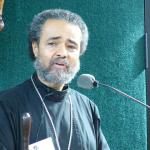
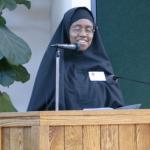 My personal epiphany was strengthened as I saw the devotion of the African-American Orthodox nuns who have devoted their entire lives to prayer and service. My European arrogance began to diminish as I heard Father Jerome Sanderson, Orthodox Priest and author of Saint Moses the Ethiopian from the African Saint Series, talk of the history of slavery and pointing out that his great grandparents were Orthodox Christians in Ethiopia when they were captured and put in shackles. The reality that Christianity is multi-racial, not only today, but from its very conception, struck me in such a way that allowed no more room for me to continue seeing in my own color. But, the hallmark of the Conference to me was the sharing in the Liturgy led by European, African American, African, Russian, and Serbian priests and deacons, all at the same altar, all at the same time, all in one accord. This is the church. This is the community of faith. The old childhood song,
My personal epiphany was strengthened as I saw the devotion of the African-American Orthodox nuns who have devoted their entire lives to prayer and service. My European arrogance began to diminish as I heard Father Jerome Sanderson, Orthodox Priest and author of Saint Moses the Ethiopian from the African Saint Series, talk of the history of slavery and pointing out that his great grandparents were Orthodox Christians in Ethiopia when they were captured and put in shackles. The reality that Christianity is multi-racial, not only today, but from its very conception, struck me in such a way that allowed no more room for me to continue seeing in my own color. But, the hallmark of the Conference to me was the sharing in the Liturgy led by European, African American, African, Russian, and Serbian priests and deacons, all at the same altar, all at the same time, all in one accord. This is the church. This is the community of faith. The old childhood song, 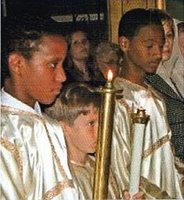
 "Jesus loves the little children, all the children of the world, red and yellow, black and white, they are precious in his sight, Jesus loves the little children of the world",
"Jesus loves the little children, all the children of the world, red and yellow, black and white, they are precious in his sight, Jesus loves the little children of the world",finally had real meaning.
The mission of the Brotherhood of Saint Moses the Black is a clarion call for all Christians everywhere to reunite in this historic hour under the One Holy, Catholic, and Apostolic Church which is the original church of the New Testament, the Orthodox Church. Father Moses words say it best,
"In modern times, there is a renewed fountain of ancient Orthodox Christianity. It is flowing throughout the entire world. This flow of spiritual life does not negate the rich tradition already developed in the crucible of suffering and the triumphs of character in America. Rather, it beckons all Americans to row into deeper waters-the waters of the ancient Christian movement that has been kept alive in the Eastern Orthodox church."
"In modern times, there is a renewed fountain of ancient Orthodox Christianity. It is flowing throughout the entire world. This flow of spiritual life does not negate the rich tradition already developed in the crucible of suffering and the triumphs of character in America. Rather, it beckons all Americans to row into deeper waters-the waters of the ancient Christian movement that has been kept alive in the Eastern Orthodox church."
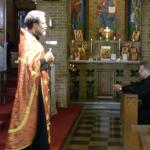
"Preserve oh God,
the Holy Orthodox Church
and all
Orthodox Christians
unto ages of ages
amen."

I enjoyed your article on African Orthodoxy.
ReplyDelete> Yes, there were indeed early African churches, but
> of course in most Protestant churches, especially
> the woefully uninformed Southern Baptists, they
> don't know early Christian history. Your
> lightbulb-going-off recognizing your previous
> European bias is similar to an experience I had: I
> remember feeling funny seeing a black cowboy in a
> movie, and thinking "blacks weren't cowboys". Boy
> was I wrong! I now know that fully a quarter of
> cowboys were black. So much for my white European
> bias!
I only recently found out that there were many black cowboys in the Wild Wild West too. It's good that we discover our biases, even if unintended.
DeleteWow...i am really enjoying this marvelous work...i have become a fan of Father Moses as well...i pray one day i'll get to meet him in person...please pray for our mission here in Jamaica...and pray for me...a sinner...thank you all...
ReplyDeleteAmazing testimonies here. Yes, Christianity pre-dates Islam in Africa by 600 years. Sadly many African Christians are being persecuted in large numbers, just like their brothers and sisters in the Middle East.
ReplyDelete